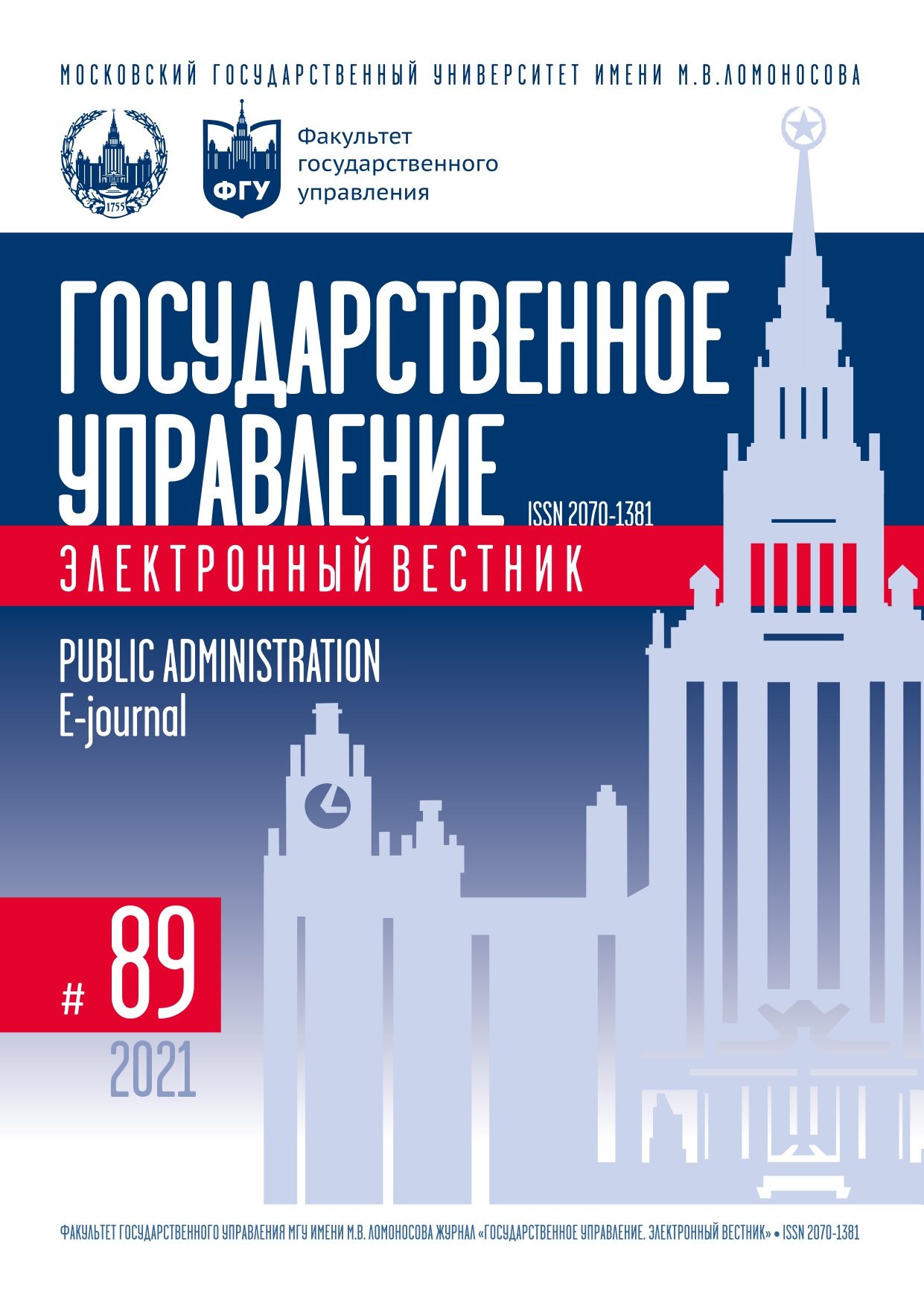Legitimating Government Decisions: Opportunities and Limitations of Persuasive Communication
Keywords:
Persuasive communication, government decisions, legitimation, evidence-based policy, scientific and expert community, public spaceAbstract
The deliberative turn in public administration has contributed to the active spread of various forms of citizen participation in the development of government decisions. The consequence of the citizens’ involvement in management processes was the growth of their interest in obtaining high-quality information about the management problem. To satisfy this request, the state is forced to make adjustments to its policy of information support of state decisions, to include not only information and manipulation tools, but also persuasive communication. This article assesses the possibilities and limitations of building persuasive communication by the state based on full-fledged argumentation, scientific arguments and evidence. The data of a focused interview of civil servants and the scientific and expert community, conducted on the basis of a specially developed questionnaire, are used. It is shown that in connection with the growth of scientific knowledge authority, the state is increasingly resorting to such an instrument of legitimizing state decisions as creating images of government bodies actively cooperating with the scientific and expert community, relying on scientific research and objective evidence in developing state policy. However, the real effect of such an instrument in our country turns out to be lower than expected due to mass perception of the decision-making process as behind the scenes, closed, focused on the selfish interests of the elite strata. It is proved that a number of conditions are necessary to create a model of persuasive communication based on the principles of openness, objectivity and evidence. Firstly, the political and administrative elite should demonstrate a real interest in “overturning” evidence-based politics into the public space, in pursuing an open information policy. Secondly, the scientific and expert community should refrain as much as possible from their value preferences in the analysis of the management situation and use valid evidence-based policy tools. Thirdly, while recognizing the importance of using evidence-based policy tools in the public space of persuasive communication, one should take into account the need to adapt them to the characteristics of mass perception.
References
Андреева Г.М. Психология социального познания. М.: Аспект Пресс, 2009.
Аронсон Э. Общественное животное. Введение в социальную психологию. СПб: Прайм-Еврознак, 2006.
Ачкасова В.А., Журавлева Н.Н. Пропагандистская составляющая государственных коммуникаций // Стратегические коммуникации в бизнесе и политике. 2018. № 4. С. 50–56.
Барсуков Н.С. «Эхо камеры» в Интернете: иллюстрация «эффекта эха» на примере Брексита // Государство и граждане в электронной среде. 2018. № 2. С. 73–86.
Бессетт Д.М. Тихий голос разума. Делиберативная демократия и американская система государственной власти. М.: РОССПЭН, 2011.
Богомолова Н.Н. Современные когнитивные модели убеждающей коммуникации // Мир психологии. 1999. № 3. С. 46–51.
Быков И.А. Государственный PR и политическая элита в современной России // Журнал политических исследований. 2019. Т. 3. № 3. С. 15–23.
Величковский Б.М. Когнитивная наука. Основы психологии познания. М.: ИЦ «Академия», 2006.
Волошинская А.А., Комаров В.М. Доказательная государственная политики: проблемы и перспективы // Вестник Института экономики Российской академии наук. 2015. № 4. С. 90–102.
Галлямова Э.М. Доказательная государственная политика: возможности и ограничения // Социология. 2021. № 2. С. 158–162.
Макарычев А.С. Государства, экспертные сообщества и режимы знания-власти // Политическая наука. 2015. № 3. C. 9–26.
Митрохина Т.Н. Политическая повестка дня: понятие, специфика, субъекты формирования // Вестник Саратовского государственного социально-экономического университета. 2019. № 1(75). C. 176–180.
Павлова Т.В. Делиберация как фактор конституирования поля современной политики // Политическая наука. 2018. № 2. С. 73–94.
Пушкарева Г.В. Менеджмент публичных ценностей: можно ли говорить об аксиологическом повороте в государственном управлении // Государственное управление. Электронный вестник. 2018. № 68. С. 312–329. DOI: 10.24411/2070-1381-2018-00044.
Росс Л., Нисбетт Р. Человек и ситуация. Уроки социальной психологии. М.: Аспект Пресс, 1999.
Сунгуров А.Ю. Экспертное сообщество и власть: модели взаимодействия и проблемы гражданской ответственности // Полис. Политические исследования. 2018. № 4. С. 130–142. DOI: https://doi.org/10.17976/jpps/2018.04.10.
Сунгуров А.Ю. Экспертные сообщества и власть. М.: Политическая энциклопедия, 2020.
Сунгуров А.Ю., Карягин М.Е. Российское экспертное сообщество и власть: основные формы взаимодействия // Полис. Политические исследования. 2017. № 3. С. 144–159. DOI: https://doi.org/10.17976/jpps/2017.03.10.
Фестингер Л. Теория когнитивного диссонанса. М.: Эксмо, 2018.
Хабермас Ю. Вовлечение другого: очерки политической теории. СПб.: Наука, 2008.
Чугров С.В. Post-truth: трансформация политической реальности или саморазрушение либеральной демократии // Полис. Политические исследования. 2017. № 2. С. 42–59. DOI: https://doi.org/10.17976/jpps/2017.02.04.
Чумиков А.Н., Бочаров М.Б. Государственный PR. Связи с общественностью для государственных организаций и проектов. М.: ИНФРА-М, 2020.
Шестопал Е.Б. Политическая повестка дня российской власти и её восприятие гражданами // Полис. Политические исследования. 2011. № 2. С. 7–24.
Якимец В.Н., Никовская Л.И. Проблема состоятельности институтов публичной политики в контексте менеджмента публичных ценностей // Каспийский регион: политика, экономика, культура. 2015. № 3(44). С. 57–63.
Chaiken S. Heuristic versus Systematic Information Processing and the Use of Source versus Message Cues in Persuasion // Journal of Personality and Social Psychology. 1980. Is. 39. Р. 752–766. DOI: http://dx.doi.org/10.1037/0022-3514.39.5.752.
Chapel Z. Deliberative Democracy. A Critical Introduction. New York: Palgrave Macmillan, 2012.
Katz Е., Lazarsfeld P. Personal Influence: The Part Played by People in the Flow of Mass Communications. Glencoe, Ill.: The Free Press, 1955.
Lucas D.S. Evidence-Based Policy as Public Entrepreneurship // Public Management Review. 2018. Vol. 20. Is. 11. P. 1602–1622. DOI: https://doi.org/10.1080/14719037.2017.1412115.
McCombs M. Setting the Agenda: The Mass Media and Public Opinion. Cambridge: Polity Press, 2014.
Oliver K., Lorenc T. New Directions in Evidence-Based Policy Research: A Critical Analysis of the Literature // Health Research Policy and Systems. 2014. Vol. 12. DOI: https://doi.org/10.1186/1478-4505-12-34.
Petty R.E., Cacioppo J.T. Communication and Persuasion: Central and Peripheral Routes to Attitude Change. New York: Springer-Verlag, 1986.
Stoker G. Public Value Management: A New Narrative for Networked Governance? // American Review of Public Administration. 2006. Vol. 36. Is. 1 Р. 41–57. DOI: https://doi.org/10.1177/0275074005282583.

